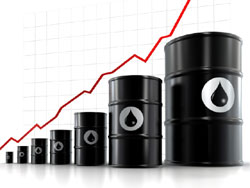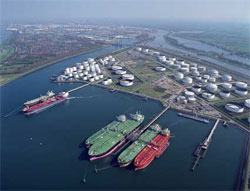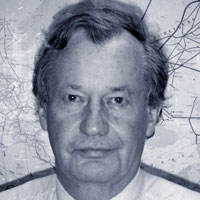France declares war on oil speculators
Plea for a European oil strategy
France declares war on oil speculators
France is positioning itself to lead a European bid to reform the international oil market and make it more transparent. The French government has embraced a high-level report that calls for far-reaching measures to further regulate the oil trade, strengthen the dialogue between producer and consumer countries, and to develop, for the first time, a genuine European oil strategy.
 |
| In 2008, oil prices soared to $147a barrel. A lot of people believe that this had nothing to do with market fundamentals, but that it was a price surge mostly driven by speculation. |
As the title implies, the French government wanted to know what options it has to limit the volatility of oil prices, which has increased radically in recent years as a result of the increased speculation in “paper” oil. This volatility is regarded by many as undermining investments in the physical oil markets as well as countries’ energy policies. The report comes up with 22 concrete proposals. These include, as part of a European oil strategy, more frequent publication of oil stock levels in Europe, the creation of a European platform for physical petroleum transactions and the harmonisation of national oil taxation policies in the EU. According to Chevalier, Economy Minister Lagarde has given the report a very positive reception. ‘It won’t end up gathering dust in a drawer’, he says in an interview with European Energy Review (see here).
France may not be regarded as the most logical candidate to try to regulate international oil markets, but the country does have a history of international “oil diplomacy” efforts. In 1991, at the time of the Gulf War, France, together with Venezuela, created the International Energy Forum (IEF), the only real forum for global dialogue between oil producers and consumers. Under the auspices of the IEF, oil ministers from around the world will be meeting in Cancun, Mexico, at the end of March, where the subject of oil price volatility will have a high priority on the agenda. (See here for a recent interview with IEF Secretary General Noé van Hulst.)
In the 1970s, France took a different approach to the oil crisis of that time. It decided to protect itself against oil dependence by launching its own nuclear programme, making it the most ‘nuclear’ country in the world today.
In today’s globalised world, any French moves to “tame” the oil trade must be taken in conjunction with other governments. But when France was president of the EU in 2008, France’s President Nicolas Sarkozy has shown that he has the energy to move things along that were thought to be blocked. And many other countries are also concerned about oil prices nowadays being “out of control”. In the US, the Commodity Futures Trading Commission (CFTC) is working on proposals to reform commodity markets, especially the oil markets. Europe is only just starting to think about the process. However, the reform of financial markets as a whole is a unique window of opportunity that Paris does not want to miss out on.
Vicious circle
So what are the main conclusions of Chevalier’s investigation? His first assertion is that the reforms of the regulation of financial markets that are underway will not be sufficient to considerably reduce ‘this volatility which has grown over time’. In what is probably an understatement, Chevalier acknowledges that the reforms are coming up against technical difficulties and resistance from the financial community.
 |
| Oil stored in the harbour of Rotterdam |
What, then, can be done? If one had to pick one word to describe the backdrop to almost all the proposals put forward by the Chevalier report, it would be ‘transparency’ or ‘knowledge’. While he does not have a silver bullet solution, Chevalier does propose three areas of action: create a genuine European oil strategy, strengthen producer-consumer dialogue and regulate the markets for derivative products and physical markets.
In Brussels, there is quite a bit of work to be done in this area. ‘At the European level, the oil issue is not very present whilst oil is still the most important of our primary energies’, says Chevalier. Chevalier concludes what European environmentalists have been complaining about for years: oil is missing from European energy policy.
Oil is a ‘touchy’ area in the EU, Chevalier notes. The issue of oil stocks is even taboo. Every time that the European Commission has tried to secure more transparency in oil stocks, it has come up against insurmountable resistance. Proposals in 2002 for reforming oil stocks management were rejected and in 2008 proposals were considerably watered down before being adopted in 2009. The weekly publication of oil stocks, which some have called for, will probably never see the light of day. It is estimated to cost €6 million per year and its effect on the reduction of price volatility is unproven, according to an internal report from the European Commission. Chevalier therefore proposes that the Commission restricts itself to improving the reliability of information and to shortening the periods between publication of stocks, which is currently every two months.
It also proposes constructing scenarios for the evolution of demand in oil products at the European level that are consistent with the EU’s climate change strategy and seeking agreement within the EU on energy policies that might affect the demand for oil products. One way of doing this would be to harmonise tax policies on oil products, another very sensitive issue, which has been regularly buried by European governments. For most member states, taxation and in particular taxation on oil products, which brings in considerable revenue (the fourth highest generator of tax revenue in France), is a “no go” area.
Battle to fight
With regard to the transparency of European markets, Chevalier favours the emergence of a transparent platform for transactions on physical oil products in Europe, the requirement of transparency obligations on operations carried out on the ARA (Antwerp-Rotterdam-Amsterdam) bunker hub; and an investigation of the process of price formation on the physical markets for oil products.
For example, Chevalier wants to investigate the establishment of oil quotations by Platts and Argus. For Chevalier, ‘it would be more normal to have a market on which prices are formed completely transparently. Even some big operators complain about it. There needs to be an investigation or a study to make the systems for supplying these products, including those coming from Russia, more transparent’.
In terms of the international dialogue between producers and consumers, the Chevalier report advocates strengthening the role and legitimacy of the International Energy Forum (IEF), which, despite appearances, only enjoys passive support from most of its member states: only 40 of the 90 members (states or oil companies) taking part in its work and in the JODI (Joint Oil Data Initiative) initiative are up to date with their financial contributions for the running of the Secretariat.
Finally, the report proposes a series of measures in conjunction with the initiatives underway in the US and more broadly at a global level to improve the transparency of oil markets, both physical and financial. The aim is to fully apply the global guidelines agreed by the G20 for commodities and financial markets and for oil in particular. The Chevalier report goes even further by proposing specific additional
 |
| Jean-Marie Chevalier |
But the discussions on global measures are long, technical and scattered over organizations worldwide. For Chevalier, the easiest things to put in place from a French perspective are a genuine European oil strategy and the strengthening of the IEF. So far, political leaders have been powerless in the face of the volatility of oil prices, which have no real links to their physical fundamentals. Now they have a catalogue of proposals to create some order in the international oil market and President Sarkozy has a new battle to fight.
For the interview with Jean-Marie Chevalier click here